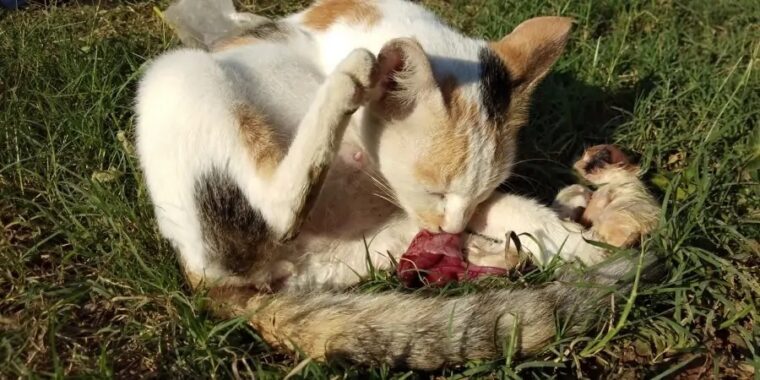
If your cat just gave birth and you’re wondering what to do, the answer is likely not much, at least not right away as long as everything has gone well with the delivery and you’re looking at a bunch of happy, healthy kittens. Mother cats generally manage to make it through labor and delivery without human assistance, and most don’t need help dealing with their newborn kittens.
However, ensuring that your cat and her babies are doing well is important. Take a look to ensure the kittens’ noses and mouths are clear of fluid and mucus and that the mother has removed the sac from the kitten completely. Contact your veterinarian immediately if you have concerns or think a kitten may need assistance.
It’s also important to ensure the kittens start nursing relatively quickly after birth. If a kitten hasn’t started suckling within two hours of birth, reach out to your veterinarian for advice, as you may need to step in and try to encourage the kitten to nurse.

Are There Other Things to Do Right After My Cat Gives Birth?
Giving your cat a comfortable, warm place to stay, plenty of food and water and space to move around are all critical to creating a comfortable and inviting environment that supports your cat and her kittens.
Warmth
Make sure your cat has a nice, warm place to care for her kittens. Kittens don’t have the ability to regulate their temperatures for the first 2 weeks of their lives, so they rely on their mother and each other to stay nice and toasty.
Keeping kittens warm is critical to their overall health and development, so try to ensure they have an environmental temperature of around 89°F to 93°F for the first few days after birth.1 This temperature can gradually be decreased over time. By the end of the fourth week of life, kittens will be comfortable at 75°F.
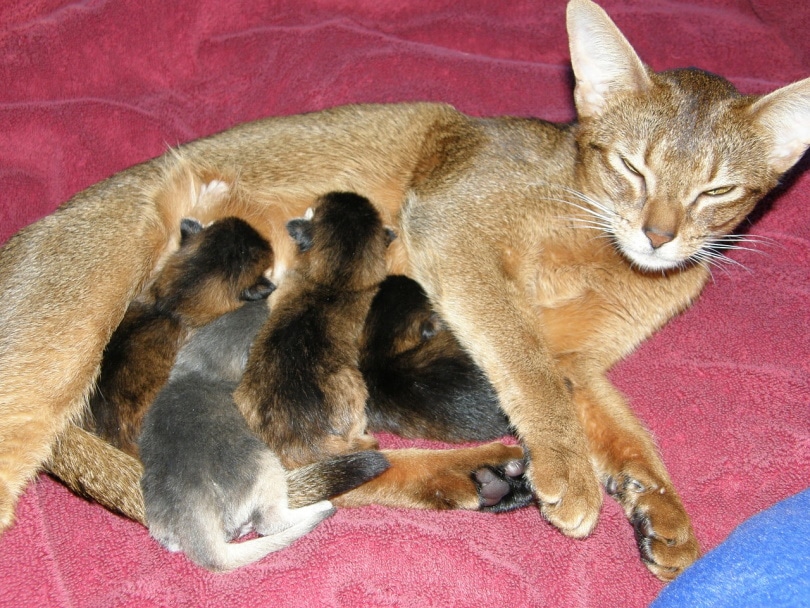
Quiet
Provide a quiet space for your cat and her kittens to be. Reduce disturbances and loud noises as they can cause a nursing queen to become anxious. Unfamiliar surroundings, strangers or frequent disturbances can affect the queen’s milk production and lead to maternal neglect. First time mothers are often particularly sensitive to environmental disruptions.
Solitude
Most queens prefer to be left alone entirely when their kittens are tiny and vulnerable, so try to give your cat and her babies a bit of space to allow nature to take its course. Some new cat mothers prefer well-loved humans to refrain from touching newborn kittens. Veterinarians often suggest limiting the amount of contact people have with kittens until they’re a few weeks old and their eyes are open.
Bedding
Provide clean bedding for your cat and her kittens, but avoid moving her or the kittens for the first few days. Once everyone has settled in, you can change the bedding when your cat decides to have a snack or go to the bathroom.
Good options for bedding include easily washable items like old towels and pillowcases.

Pets
If you have any other pets, it is a good idea to keep them out of the area where the kittens are nursing to keep your cat from becoming stressed and protective. As mentioned, anything that makes a mother cat feel vulnerable can interfere with her natural mothering instincts and can make it more likely for her to abandon her litter.

Are There Potential Post-Delivery Complications to Be Concerned About?
Most cat pregnancies go off without a hitch, but occasionally, problems can pop up. Reach out to your veterinarian if your cat shows signs of vaginal bleeding or discharge, but remember that a small amount of post-delivery spotting is normal.
Inflammation of the uterus and mammary glands can also be a problem, as can uterine prolapse. Metritis, or uterine inflammation, results when part of the placenta is retained in the uterus. A bacterial infection is typically also present due to the material left behind in the uterus. Signs of metritis include vaginal discharge, fever, and lethargy. Cats suffering from the condition often have trouble caring for their kittens and need veterinary attention promptly.
Kittens who are crying and having difficulty settling can indicate that a queen may be suffering from a condition such as metritis. Uterine prolapse is very rare in queens but can be caused by straining during labor and delivery. Mastitis (inflamed mammary glands) is also quite rare in cats but it can occur. It is usually caused by a bacterial infection and may involve one or several glands. Signs include painful and swollen mammary glands, and as the inflammation progresses, the infected glands will become increasingly discolored (red or purple) and painful. Milk from the infected glands may contain blood and pus.
The condition can usually be resolved with antibiotics, but depending on the severity of the infection, the queen may need additional supportive care and the kittens may need bottle feeding while the queen is unwell. Contact your veterinarian immediately if you see signs indicating your cat may be developing complications.
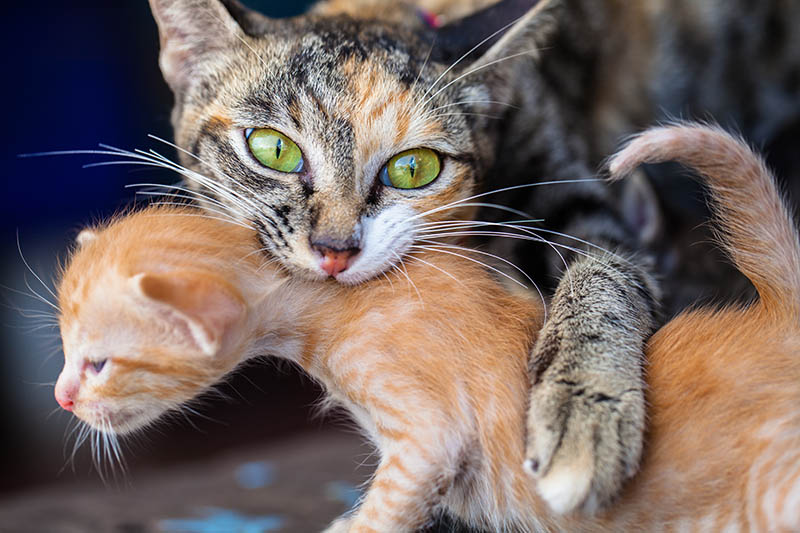
Do Cats Ever Reject Kittens?
Yes. Cats are usually quite affectionate with their kittens, often licking them and giving them loving attention, but sometimes things can go wrong.
Cats can reject kittens for a few reasons, including stress and the inability to care for several babies at once. This can be particularly common in first time queens.
Queens who become particularly stressed can reject and even kill kittens. It’s one of the reasons providing a quiet, safe place for your cat to give birth and stay with her kittens while they’re young is so important. Cats can also neglect kittens who they sense are particularly weak or ill.
Some queens reject kittens who are handled too much in the first weeks after they’re born. Signs a cat may not be bonding with her kittens include not permitting newborns to nurse, leaving babies without supervision, and generally not paying attention to the litter. Reach out to your veterinarian if your cat is having issues with one or more of her kittens.
How Can I Tell if The Kittens Are Doing Okay?
During the first few weeks, kittens aren’t usually all that active; they mostly sleep and eat, and that’s about it. Kittens who cry when they’re awake may not be feeling well or may be having trouble getting enough food. Make arrangements for your cat and her kittens to be seen by your veterinarian if your kittens appear to be uncomfortable when eating or if there’s lots of crying.
Contentment and a steady weight gain are both signs that newborn kittens are doing well. Reach out to your veterinarian if it appears that one of the kittens is losing weight, as healthy ones generally increase their body weights by about 10-15g a day.2
Kittens should have periods when they’re awake and trying to get on their feet by the second week, and they should generally be trying to explore the world outside of the nest by the time week three rolls around.
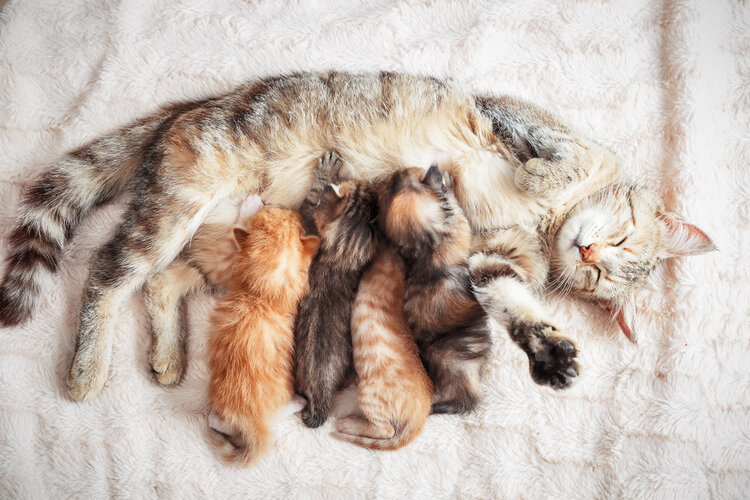
Do I Need to Feed the Kittens?
Newborn kittens don’t require anything but their mother’s milk in their first few days and weeks of life. The first milk queens produce is called colostrum, which is full of antibodies and gives a kitten’s immune system an essential boost. They can generally start the weaning process (introducing solid food) when they’re between 3 to 4 weeks old.
Reach out to your veterinarian if the kittens seem to be crying a lot or if you notice a kitten has lost or not gained weight in 24 hours. Weighing kittens daily is extremely important as a way of assessing their health.
Do Cats Move Kittens Around?
Yes. It’s usually nothing to be terribly concerned about if your cat decides to move her kittens from one location to another. It’s relatively common for cats to look for places that feel less exposed or provide more warmth.
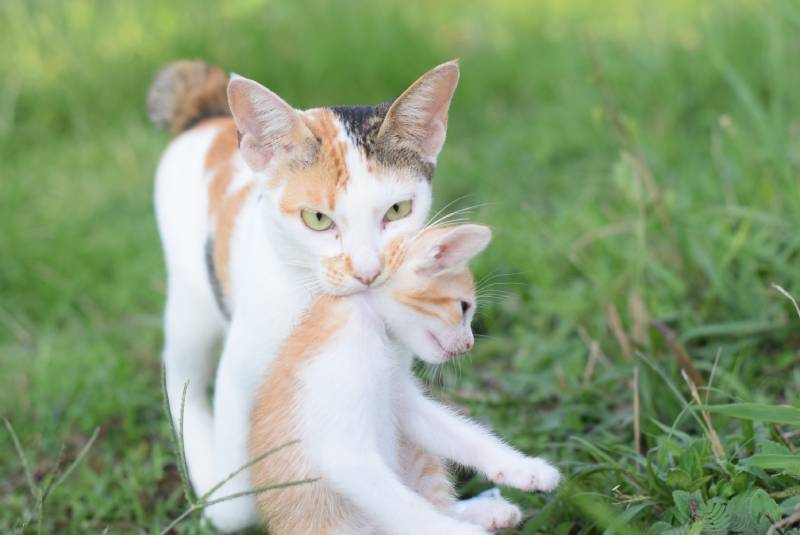
Do Cats Sometimes Avoid People After Giving Birth?
Yes. Queens can be less interested in interacting with their favorite people in the period immediately after giving birth, but things usually get back to normal within a few weeks.
Do I Need to Worry About Socializing the Kittens?
Yes, but not right away! Socialization is the process of exposing kittens to new experiences and getting them used to being handled by and comfortable around people. The prime kitten socialization period is generally when they’re between 2 and 7 weeks old, but you may need to wait longer before getting started.
When Should Kittens Have Their First Veterinary Checkup?
Kittens and queens should be seen by a veterinarian just to make sure everything is moving in the right direction. Give your veterinarian a call soon after your cat gives birth and advise them of the situation; they can provide you with specific advice about the best time to schedule a check up for the queen and her kittens.

Conclusion
There’s usually not much that owners need to do immediately after their cat has given birth. Queens take care of all their babies’ needs for the first month or so after they’re born. They provide food and warmth and help their kittens stay clean and go to the bathroom.
Most mothers prefer humans to keep their distance from newborn kittens. Veterinarians advise pet parents to minimize the time spent handling kittens until they’re at least a few weeks old to prevent mother cats from becoming stressed and rejecting their kittens.
Featured Image Credit: Akhmad Sopiyan, Shutterstock






